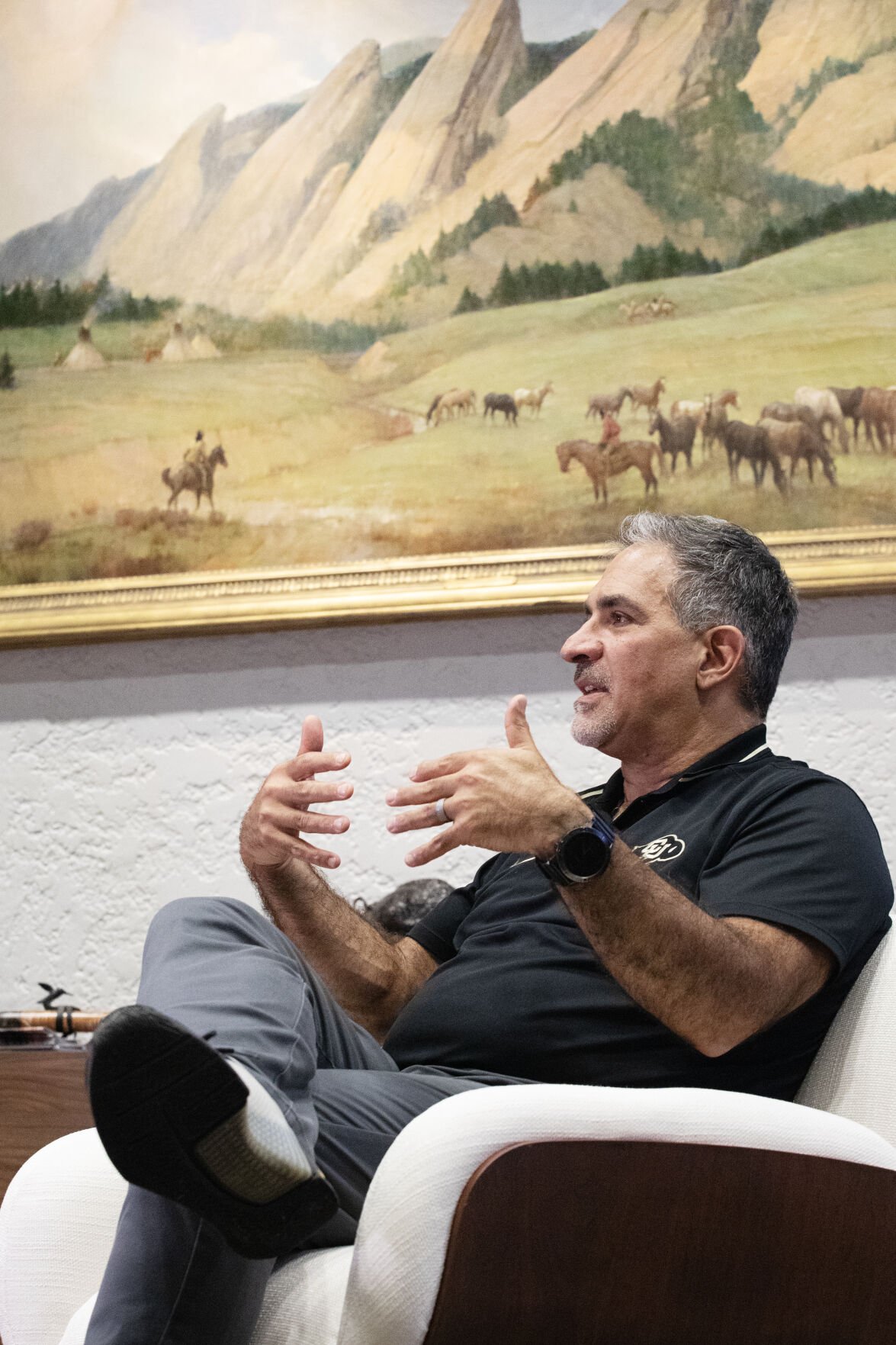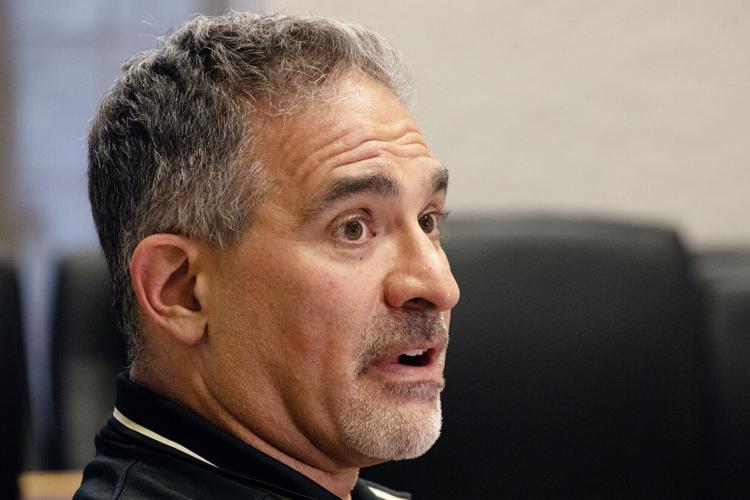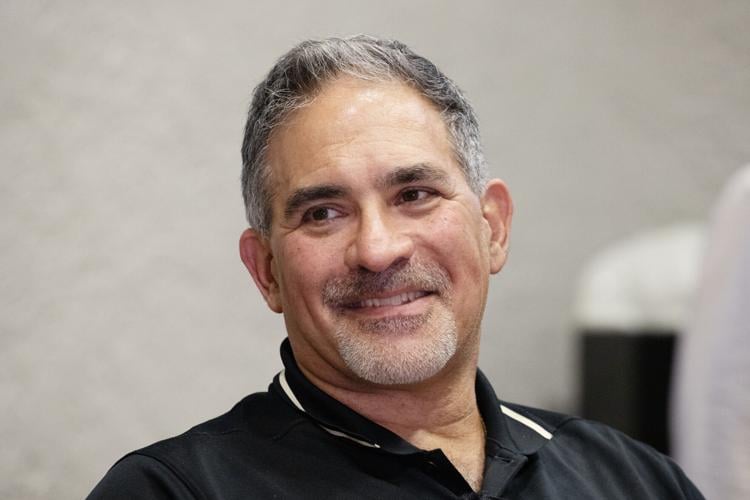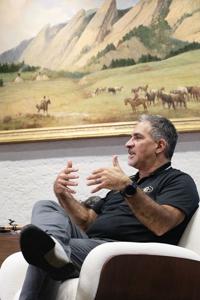Justin Schwartz Q&A on his first year as chancellor of CU Boulder
University of Colorado Boulder’s Chancellor Justin Schwartz just completed his first year in the high-profile role.
Coming to the university in July 2024, Schwartz replaced longtime chancellor Phil DiStefano, who served as chancellor for 15 years — the longest in CU Boulder history.
Before coming to CU, Schwartz served as the executive vice president and provost at the Pennsylvania State University for just under a year, and as Harold and Inge Marcus Dean of Penn State’s College of Engineering for five years.
University of Colorado Chancellor Justin Schwartz sits down with a Denver Gazette reporter for an interview on his first year in office.
{
“@context”: “https://schema.org”,
“@type”: “VideoObject”,
“name”: “CU Chancellor Justin Schwartz on Coach Prime, student sports’ pass”,
“description”: “University of Colorado Chancellor Justin Schwartz sits down with a Denver Gazette reporter for an interview on his first year in office.”,
“thumbnailUrl”: “https://bloximages.newyork1.vip.townnews.com/denvergazette.com/content/tncms/assets/v3/editorial/0/4c/04c6e213-3046-5a90-afa1-98f086d3067b/689ce3febf466.image.jpg”,
“uploadDate”: “2025-08-14T14:51:00-06:00”,
“contentUrl”: “https://cdn.field59.com/GAZETTE/a0ad82601ba58c0b127b3f368c198c4cc23ec14e_fl9-360p.mp4”
}
After he started, Schwartz expressed a desire to increase CU Boulder’s impact both locally and globally.
In a recent interview with The Denver Gazette, Schwartz reflected on his first year as chancellor and spoke about sustainability, research funding, CU Buffs football, free speech and the changing landscape of higher education.
The interview has been edited for clarity and brevity.
Denver Gazette: You had mentioned a few of your top priorities when you were coming into this role, and one of those was making CU more sustainable. So in this first year, what are some of the steps you’ve taken to make CU more sustainable?
Schwartz: So first thing we did was, I did a listening tour. One of the most recurring questions was ‘why is it that we do so much in sustainability and we’re not known for it?’ So knowing that the chief sustainability officer was approaching retirement, we created the new vice chancellor for sustainability position. [We] did the national search hit the jackpot with Andrew Mayock coming from being chief sustainability officer for the federal government in the White House, we brought him in to help really build out.

University of Colorado Chancellor Justin Schwartz is heading into his second academic year at the helm of CU's leadership.
Tom Hellauer/Denver Gazette

University of Colorado Chancellor Justin Schwartz is heading into his second academic year at the helm of CU’s leadership.
I asked the leadership team almost a year ago: ‘what do we need to do to get rid of single-use plastics?’ That’s now been done. Which is, I think, a big win.
This afternoon we announced a $10 million gift from an alum, Spike Buckley, to create the Buckley Center for Sustainability Education. It’s $10 million over five years to have support for faculty fellows to work on building deeper sustainability related curriculum for classes across all disciplines and opportunities for students to have support also to work in that space.
We want to lead on campus, but we also know that if we if we could go carbon neutral tomorrow on campus, but nothing happened in the rest of the world, it wouldn’t make a big difference.
DG: In January, CU Boulder’s DEI website was renamed the “Office of Leadership Support and Programming.” How is this office’s function different now from when it was a DEI website, if at all — or is that just more of a name change?
Schwartz: So the full story on that is that a year ago the senior vice chancellor came to me and said she wanted to change the name of the office long before we were in election season. I actually didn’t like the first version that she had suggested, so she went back to her team, and they were working on other names, and it took a while just to get back to it because other things were happening.
The idea behind the name change was simply the idea that one central office could implement DEI across the campus, didn’t make sense. But by having it named that way, that was sort of the implication.
The idea was really that office would help leadership across campus, learn how to build more inclusive environments, be more supportive of belonging for students, faculty and staff, right and really work on every unit to have their own unit specific goals for what’s the one thing they’re going to do right in this area? So what were they actually doing as a team? They were doing leadership, support and development. So in the spirit of the title, should represent what people do — she wanted to change the name of the office in that direction, and that’s where we landed.
DG: And so that name change, I know it came at a time where people speculated it that it had something to do with the federal government.
Schwartz: Yeah the timing was really not ideal. It did not. And you also can see, the office is staffed as strong as it was before.
DG: In your 2025 State of the Campus address you mentioned the rapidly changing landscape of higher education with regards to federal policies; specifically federal support for research. In April, CU Boulder suffered a $9.4 million dollar loss in federal funding. How is the University navigating these cuts and do you anticipate more to come?
Schwartz: So the crystal ball is out at the shop.
We’ve had some grants that were frozen and are now melted, and they’re back, and so they’re in play. You know, even still today, but in April, things were very much: Here’s an executive order, here’s a temporary restraining order. We don’t know what’s going to happen. A lot of those TROs are still in place. What we are seeing currently in the Senate Committees are actually much more support for continuing the research enterprise than what was in the President’s budget.
So we are, I don’t want to use the word optimistic, but we’re cautiously hopeful that the you know, the legislature has a responsibility for passing the budget first. And you know, through the system office, we’ve been working with both Colorado senators and the full Colorado delegation of congress people, which is four and four politically, to basically make the case for this is why the work we do is so important.
There’s always been strong bipartisan support for things like (National Institute of Health) NIH, for basic research, for aerospace, for NASA. So the things that we do are historically not political. And I think there is a recognition in in Congress that, you know, American strength for eight decades, has been driven in part by the research enterprise.
Do we think agencies are going to be have funding increases? Probably not. But do we think they’re going to have the level of cuts that the White House has proposed? We’re hoping not, and we think it’s a reasonable hope.
DG: In April, the CU system confirmed that 22 international students across all four CU campuses had their student visa status revoked. Has CU Boulder seen a drop in international student enrollment amid actions taken by the federal government?
Schwartz: We are anticipating that international enrollment this fall will be lower. It’s hard to be specific right now, because we’re in that window when new international students are trying to get visas, and we just don’t know who has an appointment at the embassy, who’s getting approved, who’s not getting approved, so it’s difficult for us to assess in that context. But we did see acceptances go down.
We’ll probably see a decrease in new PhD students, a significant number of our PhD students are foreign, along with the uncertainty in research funding. So if you don’t know if you’re going to have funding for a student who probably can’t get a visa, you’re probably less likely to admit them. Because you don’t want to create false hope. So that’s probably where we’ll see the biggest drop.
DG: Artificial Intelligence is rapidly expanding, and there’s no doubt that it’s affecting the entry-level job market. How is CU preparing its students for post-grad in a time where the landscape is shifting?
Schwartz: It’s tricky, right? To your point, AI is evolving fast. So first-year students starting this fall, what will AI be in four years? So that that’s part of the challenge is just the speed with which we don’t know what AI is going to be capable of. So the conversation, I think, we need to have is how do we incorporate AI as a tool in education, but also, how do we educate students to use AI as a tool? So it’s both, and I think the more our students are capable of engaging and recognizing AI as a tool for what they do, then they’ll be more prepared to go into a workforce where AI has a bigger presence.
DG: Lets talk about football. CU has had a bit of a football renaissance since the arrival of Head Coach Deion Sanders. With renewed enthusiasm, student ticket prices have also soared. A CU Boulder student sports pass was $245 dollars this year and is not included in tuition. Is CU working to make student tickets more affordable a priority for you?
Schwartz: Yeah, so there’s two issues around the sports pass that I think we need to honestly engage student government in. One is the cost of the sports pass, but also, does it make sense the way it’s constructed? Because there may be students who want basketball and not football. So I think it’s because of this renaissance, as you pointed to, I think it’s time for a conversation around, okay, so how do we best get students, not only the football games, but also to the events center for men’s basketball, for women’s basketball, for volleyball? I mean, these are great sports and great athletes also.
DG: Speaking of the “Prime effect”, Sanders contract with CU Boulder extends through 2029. How has he affected enrollment since his time at Boulder?
Schwartz: It’s hard to do a quantitative assessment, but I think he has brought national attention in a positive way that’s hard to do any other way. I think he has certainly touched communities that historically have not felt like CU is where they should be, where Boulder is where they should go. I mean, I’ve had people who are in very high leadership roles in the state of Colorado of color, saying they grew up in Denver, and they thought Boulder was so far away until they came. So I think he sort of brought Boulder closer to other people emotionally and made it seem more accessible.
He represents so many different aspects that we value, and I think that just kind of permeates in a way that hasn’t been publicly recognized, but really has such a ripple effect and positive effect across campus.
DG: Do you have any concerns that one day, when he does step down from the program, that CU will be able to maintain that sort of momentum?
Schwartz: One of the things I like to think about is, how do we take the impact he’s had and make it permanent? We see this in faculty space. So we need to build that longevity of the success that he brings and the culture that he brings of supporting the students, focusing on academics, focusing on their career preparation, and also focusing on excellence and winning, so that it just becomes what we’re known for, and then that will then continue on.
DG: Last fall, two CU Boulder students faced an “interim campus exclusion” for their part in a pro-Palestinian protest and are suing the CU for alleged free speech violations. In the spring, a video posted online showed three pro-Palestinian protesters who interrupted a CU class being physically thrown out of the classroom by a student mentor. Going into the coming school year, how will CU balance free expression and maintaining safety? What do you want students to know about on-campus protest?
Schwartz: We are extremely supportive of free speech, and even sort of the external folks who do analysis of that give us a very high score for supporting free speech. I am adamant supporter of free speech, and we will support it in every appropriate way.
We have a very clear policy in student life of educate, engage and enforce. Student Life folks will meet with people who are planning a protest as many times as needed in advance, because we actually want their protest to succeed within the policies of the university, and those policies are clearly stated.
We have a long history of engaging with the groups that have been protesting recently, of talking to them and saying, ‘This is what’s allowed. This is what we’ll do.’ We also know that protests can bring counter protests, and so we do everything we can to protect the ability of those who are legitimately protesting within the policies to do so successfully, and for counter protests to do whatever they want to do within policy successfully also.
I think the rules are actually quite supportive of what students want to accomplish. And despite all of our efforts to ensure that they understand the policies, they make the decision not to continue with the policy or to violate the policy, then we have processes in place. We have a student code of conduct, and we have very clear policies and procedures for how we assess what was the violation and what’s the appropriate response to it.
DG: Last July, you expressed a desire to address the issue of sexual assault on college campuses and look into the efficiency of CU Boulder’s sexual assault prevention training. What steps have you taken since then to improve prevention and education on campus?
Schwartz: One is we had the climate survey, and so we got most recent data for where are we doing well, where do we need to do better? Where are the situations where people are more likely to have assault situations than not?
We’re actually doing pretty well compared to national peers, which is not to say we don’t want all zeros, right?








